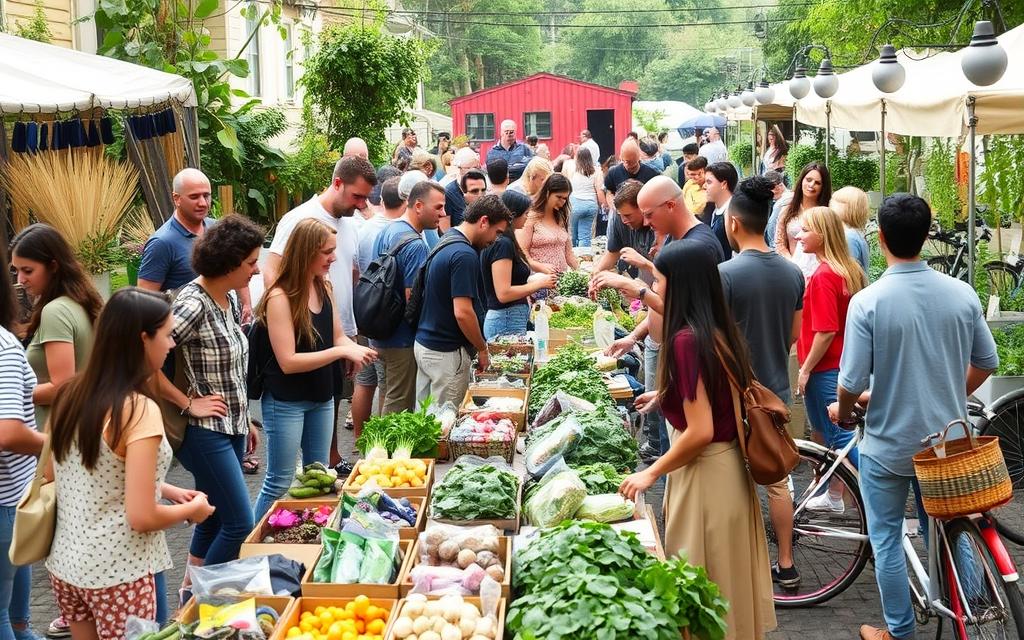Anúncios
The collaborative economy, also known as the sharing economy or peer-to-peer economy, is a new way to share resources and services. It uses technology to connect people. In South Africa, this trend is growing, helping people save money and build stronger communities.
This section will explain the basics of the collaborative economy. It will show how you can use it to cut down on spending. It’s all about working together to save money.
Understanding the Collaborative Economy Concept
The collaborative economy is growing fast, offering new ways for people to share resources and services. It focuses on working together, making our economy more sustainable and efficient. Knowing what it is, its main features, and the perks for those involved can help more people join this movement.
Definition of the Collaborative Economy
The collaborative economy, also known as the shared economy, is about sharing goods and services. It’s a smarter way to use resources, unlike old ways of buying and owning everything. Thanks to tech, people can connect and share, making things more efficient and building community.
Key Features of the Collaborative Economy
- Decentralization: It gets rid of the need for one big boss, letting everyone play a part.
- Community Engagement: It brings people together, making them feel like they belong and are working as a team.
- Technology Integration: It uses online tools to make it easy to talk and do business, reaching more people.
- Diversity of Offerings: It offers a wide range of services and products, based on what’s available and needed locally.
Benefits for Participants
Being part of the collaborative economy has many benefits. People save money by not having to own things. It’s also good for the planet, using resources wisely and cutting down on waste. Plus, it helps people meet and connect, strengthening community bonds.

Market Trends in South Africa’s Collaborative Economy
The collaborative economy in South Africa is growing fast. More people are joining in, thanks to better technology. This technology helps set up platforms for sharing, opening up new chances for everyone.
The rise of the peer-to-peer economy is changing how we get things. It’s all about finding cheaper ways to share and get what we need.
Growing Popularity Among Consumers
More South Africans are getting into the idea of sharing. They want to save money and get more value. Names like Uber and Airbnb are becoming common, showing a move towards sharing and community.
Impact of Technology on Collaboration
Technology is key to the growth of sharing platforms. It makes it easy for people to connect and share. Apps and online networks help users find each other, making it easier to share and trust each other more.
Examples of South African Businesses
Local businesses are showing what’s possible in the sharing economy. They offer co-working, ride-sharing, and even lending. These businesses use digital tools to cut costs and build community.
| Business | Industry | Platform Type | Service Offered |
|---|---|---|---|
| Uber | Transport | Ride-sharing | On-demand taxi services |
| Airbnb | Hospitality | Accommodation | Short-term rental |
| RentMyItems | Peer-to-Peer Rentals | Rental Marketplace | Goods and services rental |
| Yoco | Finance | Payment Solutions | Small business payment processing |
How to Participate in the Collaborative Economy
Joining the collaborative economy can save you money and help you use resources better. Learning how to use these platforms safely and smartly is key. It makes your experience better and helps you save more.
Platforms to Join
Many platforms have changed how we share resources. Here are some top ones:
- Airbnb: Great for finding unique places to stay, like local homes.
- Uber: Known for affordable rides, connecting drivers with riders.
- TaskRabbit: Helps you find local freelancers for tasks like cleaning or handyman work.
- BlaBlaCar: A carpooling service that cuts travel costs by finding rides between cities.
Guidelines for Safe Engagement
Staying safe is crucial in the collaborative economy. Here are some tips to keep you safe:
- Check users’ credibility by reading reviews and ratings.
- Know the platform’s rules to avoid problems.
- Choose secure payment methods to keep your info safe.
- Chat through the platform, not via personal contact info.
Tips for Maximizing Savings
To get the most out of the collaborative economy, follow these tips:
- Get alerts for price drops and deals from platforms.
- Use discounts and referral programs from shared economy services.
- Book in groups for cheaper rates on places to stay or rides.
- Travel during off-peak times for better deals.
By using collaborative platforms wisely and focusing on safety, you can save a lot. It’s a great way to enjoy the shared economy.
Case Studies of Successful Collaborative Economy Initiatives
The collaborative economy has grown a lot in South Africa. It shows how people can share resources and services. This has changed how we live in cities, especially in how we get around and where we stay.
Ride-Sharing Services in South Africa
Ride-sharing has changed how we travel in South Africa. Companies like Uber have made it cheaper and easier. Drivers can make money by using their own cars.
This has made moving around better. It also helps people meet new friends. It’s a big part of the collaborative economy.
Peer-to-Peer Accommodation Examples
Platforms like Airbnb have changed how we travel. They let people stay in homes instead of hotels. This is cheaper and more fun.
Homeowners make money by sharing their homes. It’s a way to learn about different cultures. It’s also a new way to make money.
Local Community Projects
There are many projects that show how people can work together. They share things like tools and skills. This helps neighbors get to know each other better.
Projects like community gardens and tool libraries are examples. They make living in a community better. They show how important working together is.
The Future of the Collaborative Economy in South Africa
The collaborative economy in South Africa is growing fast. This is thanks to more people using shared resources and new tech. Ride-sharing and peer-to-peer accommodation are expected to grow. They offer flexibility and savings to consumers.
Predicted Growth Areas
Transportation and housing are set to change a lot. Platforms like Bolt and Airbnb show more people are using new ways to get services. This opens up for new business ideas that focus on ease, access, and community.
Challenges and Opportunities
There are both challenges and chances ahead. Rules and too many services might slow growth. But, this also means a chance to push for good rules and practices that help everyone.
Importance of Sustainable Practices
Sustainability is key for the future. As the economy grows, it must also protect the environment and help society. By being green, South African businesses can build a strong community. They can also meet the growing demand for eco-friendly choices.



